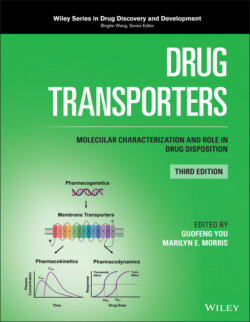Читать книгу Drug Transporters - Группа авторов - Страница 129
4.4.5 Drug–Drug Interactions and Drug–Metabolite Interactions
ОглавлениеWhen two or more organic anion substrates are available for transport, it is believed that they compete and consequently perturb the transport of each other [23]. In fact, since many OAT substrates are endogenous metabolites or commonly prescribed pharmaceuticals, competition between substrates for transport is believed to represent an important source of drug–drug interaction (DDI) [88] or drug–metabolite interaction (DMI). For example, clearance of methotrexate has been reported to be reduced with NSAIDs acting as competitive substrates for the binding sites of renal OATs leading to an increase in plasma concentration of methotrexate and the manifestation of severe toxicity in the form of bone marrow suppression and damage to intestinal epithelium [4, 23]. Interestingly, it was found that individuals genetically predisposed to hyperuricemia had an increased risk of developing gout when taking diuretics compared with individuals without the predisposition [143]. Since the drugs and the metabolite associated with hyperuricemia, urate, are primarily handled by the OATs, it is possible that this increased risk is due to drug–metabolite interaction/competition at the level of the transporters. It is also worth noting that diet‐derived compounds, like the aforementioned natural products, may also compete with drugs and metabolites.
In addition to the DDI or DMI induced by the direct interaction of OAT substrates and inhibitors on the transporter itself, certain drugs, phytomedicines or xenobiotics, can alter OAT‐mediated disposition of clinically relevant substances through an indirect manner by modulating OAT expression and function. Many OAT substrates, including indoxyl sulfate and other indole‐based compounds, have been shown to activate the aryl hydrocarbon receptor (AHR), which may play a role in the expression of OATs [144, 145]. Recent studies showed that anticancer drugs ixazomib, oprozomib, delanzomib, bortezomib, and carfilzomib enhanced OAT expression and OAT‐mediated drug transport by inhibiting proteasomal activity, thereby preventing OAT degradation in this organelle [146].
